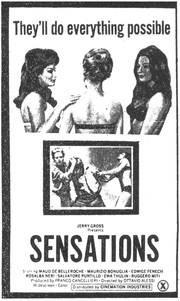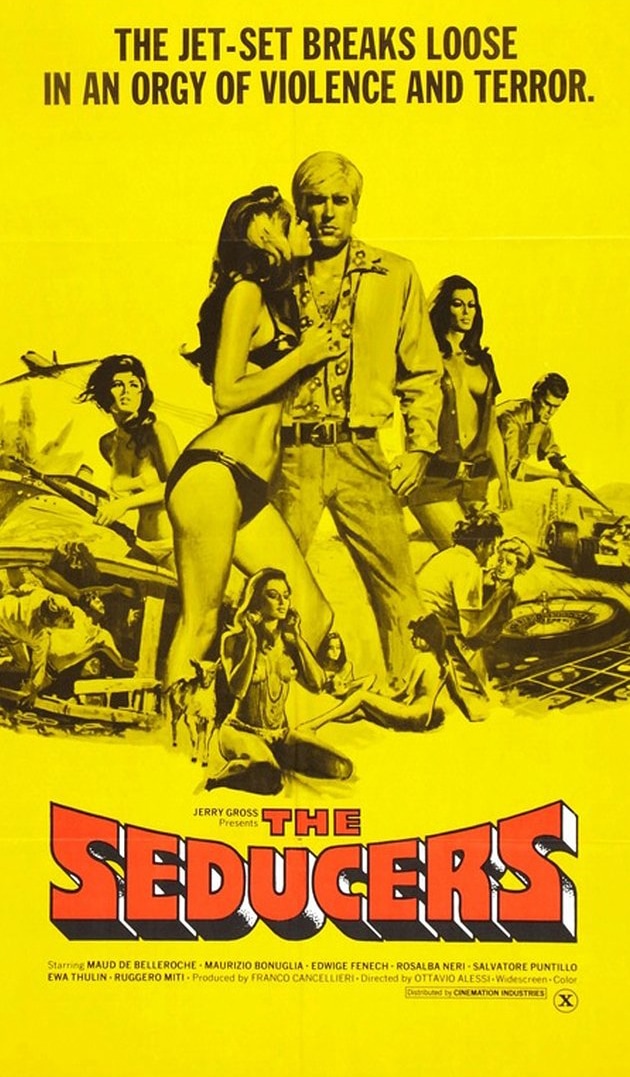
The film begins by showing Paola and Also throwing dynamite into the sea. They offer some to Tony, but he seems transfixed by the lit stick, and drops it on the deck. Paola throws it overboard just in time. We then witness several quasi-sexual encounters among the motley crew, with Tony being the only party who abstains.
Meanwhile, back on the mainland, the police try to track down the killer of a strangled prostitute. Her pimp describes her last known customer, a man matching Aldo's description.
After the boat gets beached metres away from an isolated island, Tony sneaks away from his companions and goes exploring. He meets Beba, a peasant local, who lives on the island with her brutish husband. Ulla and Aldo follow Tony, but get distracted and stage a photoshoot with a goat who performs a sex act on Ulla. Paola and Mudy also take an island detour, with Paola proving her prowess with a rifle by shooting some goats, which leads to them meeting Andro, Beba's husband.
Aldo and Ulla meet Beba and take her back to the yacht, where they ply her with alcohol. Ulla and Paola take her into a bedroom, where they style her hair and make-up and initiate a threesome, which is interrupted by Mudy. She takes Beba into Tony's bedroom and leaves them alone, hoping for the best.
Andro arrives at the boat having brought fish for Paola and Mudy, and Paola takes him up to the top deck to 'distract' him while Beba and Tony hang out below. They make a tentative connection, but Beba sees Andro's boat from a window and rushes up to find him. Seeing her wearing only a jumper and underwear, Andro is furious and beats her, only for Mudy to play a recording of his encounter with Paola, which in turn leads to Beba beating him.
The peasant couple are again separated, and now Andro is plied with alcohol by Ulla and Paola. He alternates between being smitten with them and asking where his wife is. Beba, meanwhile, is upset at her husband's admonishments. She's lectured on the merits of adulterous revenge by Mudy and again sent into Tony's bedroom.
Mudy observes Tony and Beba through a video surveillance, but is distracted by Aldo's drunken ramblings. Turning her attention back to the monitor, she sees Beba lying motionless on the bed, and sends Aldo down to check on her. Discovering that she has been strangled by Tony, a plan is hatched to dispose of her husband, who is shot by Paola.
Back on the mainland, the police detective, who is entertaining two naked women in his apartment, hears that the blonde suspect's boat, which was moored in the dock at the time of his procurement of the strangled prostitute, has been spotted near an island.
The crew leave the two peasant corpses in Andro's fishing boat and blow it up with dynamite. In exchange for helping cover up Tony's crime (or crimes, if we are to assume that the strangled prostitute is also his handiwork), Mudy agrees to cut Also and Paola in on the drilling rights.
The police land on the island, or at least somewhere in Germany that has some long grass and stuff, and walk around searching for any signs of life.
Ulla, Paola and Aldo form an alliance and decide to split the oil money three ways. Behind them in the engine room, Tony and Mudy begin passionately kissing, before Tony strangles her and throws her overboard. He pilots the yacht towards the horizon, the fates of the others on board now in his hands.
Then he takes some dynamite, and, in a slightly jarringly edited sequence that bears some suspicious similarities to the dynamite-throwing scenes at the start of the film, blows up the boat. The police watch on from the island, and, despite having had no bearing on the plot whatsoever, revel in Another Job Well Done.
As I gently hint at in that synopsis, something odd is afoot in Top Sensation. Specifically the German release, which is the version I've described. Well, there's plenty of odd stuff afoot in all versions, unless you consider bestiality and incest passé. But the German release, which is about 13 minutes shorter than the original Italian version, contains whole sequences, and even characters, which were not present in the original version.
The police investigation, which takes place in a parallel universe amid a sea of full-frontal nudity and dodgy location-doubling, was tacked on to a cut-down version of the original film in an attempt to sell the film as a giallo, or krimi, film instead of the psycho-sexual mindfuck that it is. If you remove any reference to the police from the above synopsis, you'll be left with the plot of the original film.
This original version does contain giallo elements (attractive women [/woman] dying, a vaguely-defined inheritance-type plot), and two murders-by-strangulation, which provided the framework for the German distributors to clumsily insert four short sequences (the first of which, in particular, does an admirable job of cramming as much gratuitous nudity as possible into a couple of by-the-numbers police procedural scenes). The end product, if we ignore the incongruity of these inserted scenes and charitably approach it as if it were a standalone, semi-cohesive work, plays like a krimi directed by a sex-obsessed old man who wasn't quite sure how far he could push the racier aspects of the film.
As I said, the pre-Argento staple of the inheritance plot is present in the film, sitting alongside the 'killer' Tony, who, if he was a bit more self-aware, could have been lifted straight from a post-Argento film (or even a film by Argento). It's interesting to note that the characters of the post-1969 gialli, who are driven by damaging events of their childhood, were often created and directed by men who themselves lived through some deeply damaging events (specifically WW2). Tony acts as if suffering from a particularly virulent strain of PTSD throughout the film, while you get the sense that the callous grownups surrounding him, who spend their time engaging in macho posturing and power trips, wouldn't hesitate to send him to the frontline to do their wartime bidding.
The exploitation of the peasant couple also can be seen to represent a privileged elite using and abusing a put-upon underclass, and then discarding them without a second thought once they cease to be of use. The character of Ulla, who is almost as young and naive as Tony, gradually becomes attuned to, and seduced by, the ways of the elites, and by the end has barged her way into their schemes as an equal partner.
So there is some social commentary in evidence here, at least in the original version. There's even a hint that the film takes place in some sort of mildly post-apocalyptic environment, with whatever cataclysmic event no doubt being caused by people like Mudy, and her drilling cohorts. Aldo notices that the remote island is rich in uranium, and at one point seems set to manipulate the peasants into getting access to their resources, although the murder of Beba seems to distract him from this.
The German distributors who tacked on the krimi scenes, not surprisingly, don't really acknowledge this aspect of the film. The police characters do seem to view the gang on the boat as spoilt and rich, but that's not exactly a brilliant insight. Their focus is on smoothing out the (admittedly many) rough edges of the original version, and increasing the obviously exploitable elements (exploitable from an audience perspective), hence the wall-to-wall nudity and murder element. It can't really be called a murder-mystery element, since there's absolutely no mystery created by the extra murder, apart from possibly the exact identity of the prostitute's killer.
Krimis had largely fallen from favour by the time of the film's release (it was released in Italy in 1969 and Germany in 1971), supplanted by the edgier, more grown up gialli from Italy. The police procedural aspect of the German reedit is straight from a krimi (gialli tending to favour amateur detectives), as is the humour (although slightly bawdier in this film than in classic krimis). The nudity and stark murder-aftermath scenes are more redolent of gialli, although the only on-camera killing (Mudy's strangulation) is tame enough to be from a krimi (but the preceding incestuous kiss is giallo all over).
|
The original, Italian version of Top Sensation could still be considered a giallo (as previously mentioned, it does contain several giallo-y elements, plus it was made in the pre-Argento period when the blueprint hadn't been so clearly defined). Its proximity to The Bird with the Crystal Plumage (which came out less than a year later) positions it at an interesting intersection of old and new, inheritance scheme and Freudian killer, greed and guilt, krimi and giallo. In any version, it's a hodgepodge of different ideas and influences which barely hang together. But it does have Rosalba Neri and Edwige Fenech in their prime, as well as Eva Thulin (who Tony controversially prefers to either of the brunettes; then again he is a bit mental), so what more could you want?
A better film, would be the obvious answer to that. |

 RSS Feed
RSS Feed
